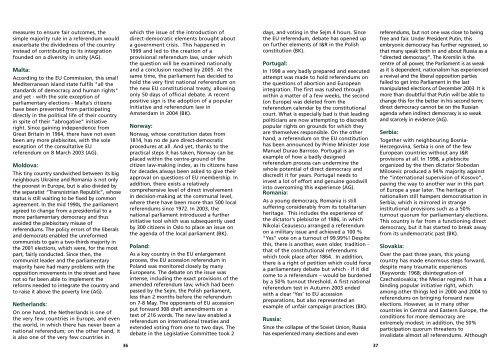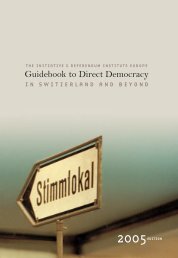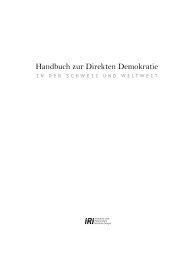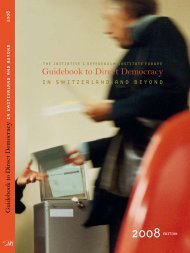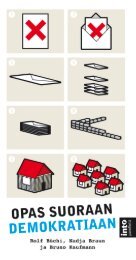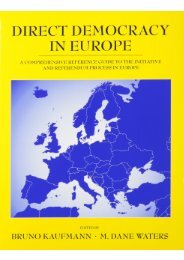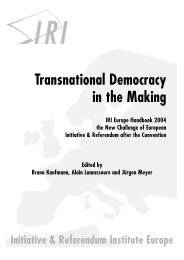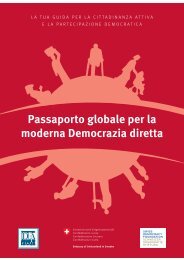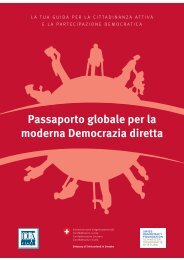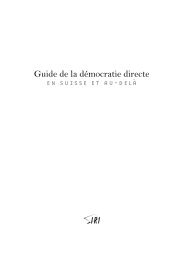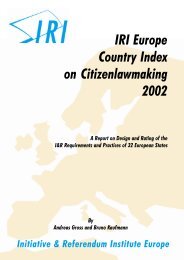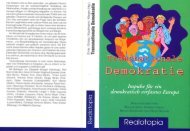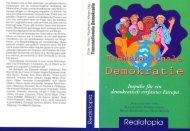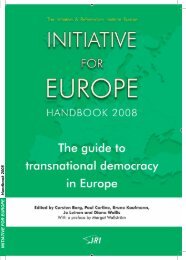Initiative & Referendum Monitor 2004/2005
The IRI Europe Toolkit for Free and Fair Referendums and Citizens’ Initiatives
The IRI Europe Toolkit for Free and Fair Referendums and Citizens’ Initiatives
You also want an ePaper? Increase the reach of your titles
YUMPU automatically turns print PDFs into web optimized ePapers that Google loves.
measures to ensure fair outcomes, the<br />
simple majority rule in a referendum would<br />
exacerbate the dividedness of the country<br />
instead of contributing to its integration<br />
founded on a diversity in unity (AG).<br />
Malta:<br />
According to the EU Commission, this small<br />
Mediterranean island state fulfils "all the<br />
standards of democracy and human rights"<br />
and yet - with the sole exception of<br />
parliamentary elections - Malta's citizens<br />
have been prevented from participating<br />
directly in the political life of their country<br />
in spite of their “abrogative” initiative<br />
right. Since gaining independence from<br />
Great Britain in 1964, there have not even<br />
been any more plebiscites, with the sole<br />
exception of the consultative EU<br />
referendum on 8 March 2003 (AG).<br />
Moldova:<br />
This tiny country sandwiched between its big<br />
neighbours Ukraine and Romania is not only<br />
the poorest in Europe, but is also divided by<br />
the separatist “Transnistrian Republic”, whose<br />
status is still waiting to be fixed by common<br />
agreement. In the mid 1990s, the parliament<br />
agreed to change from a presidential to a<br />
more parliamentary democracy and thus<br />
avoided the plebiscitary misuse of<br />
referendums. The policy errors of the liberals<br />
and democrats enabled the unreformed<br />
communists to gain a two-thirds majority in<br />
the 2001 elections, which were, for the most<br />
part, fairly conducted. Since then, the<br />
communist leader and the parliamentary<br />
majority have had many problems with the<br />
opposition movements in the street and have<br />
not so far been able to implement the<br />
reforms needed to integrate the country and<br />
to raise it above the poverty line (AG).<br />
Netherlands:<br />
On one hand, the Netherlands is one of<br />
the very few countries in Europe, and even<br />
the world, in which there has never been a<br />
national referendum; on the other hand, it<br />
is also one of the very few countries in<br />
36<br />
which the issue of the introduction of<br />
direct-democratic elements brought about<br />
a government crisis. This happened in<br />
1999 and led to the creation of a<br />
provisional referendum law, under which<br />
the question will be examined nationally<br />
and a conclusion reached by <strong>2005</strong>. At the<br />
same time, the parliament has decided to<br />
hold the very first national referendum on<br />
the new EU constitutional treaty, allowing<br />
only 50 days of official debate. A recent<br />
positive sign is the adoption of a popular<br />
initiative and referendum law in<br />
Amsterdam in <strong>2004</strong> (BK).<br />
Norway:<br />
Norway, whose constitution dates from<br />
1814, has no de jure direct-democratic<br />
procedures at all. And yet, thanks to the<br />
practical steps it has taken, Norway can be<br />
placed within the centre-ground of the<br />
citizen law-making index, as its citizens have<br />
for decades always been asked to give their<br />
approval on questions of EU membership. In<br />
addition, there exists a relatively<br />
comprehensive level of direct involvement<br />
in decision-making at the communal level,<br />
where there have been more than 500 local<br />
referendums since 1972. In 2003, the<br />
national parliament introduced a further<br />
initiative tool which was subsequently used<br />
by 300 citizens in Oslo to place an issue on<br />
the agenda of the local parliament (BK).<br />
Poland:<br />
As a key country in the EU enlargement<br />
process, the EU accession referendum in<br />
Poland was monitored closely by many<br />
Europeans. The debate on the issue was<br />
intense, including the exact provisions of the<br />
amended referendum law, which had been<br />
passed by the Sejm, the Polish parliament,<br />
less than 2 months before the referendum<br />
on 7-8 May. The opponents of EU accession<br />
put forward 308 draft amendments on a<br />
text of 216 words. The new law enabled a<br />
referendum on international treaties and<br />
extended voting from one to two days. The<br />
debate in the Legislative Committee took 2<br />
days, and voting in the Sejm 4 hours. Since<br />
the EU referendum, debate has opened up<br />
on further elements of I&R in the Polish<br />
constitution (BK).<br />
Portugal:<br />
In 1998 a very badly prepared and executed<br />
attempt was made to hold referendums on<br />
the questions of abortion and European<br />
integration. The first was rushed through<br />
within a matter of a few weeks, the second<br />
(on Europe) was deleted from the<br />
referendum calendar by the constitutional<br />
court. What is especially bad is that leading<br />
politicians are now attempting to discredit<br />
popular rights on grounds for which they<br />
are themselves responsible. On the other<br />
hand, a referendum on the EU constitution<br />
has been announced by Prime Minister Jose<br />
Manuel Durao Barroso. Portugal is an<br />
example of how a badly designed<br />
referendum process can undermine the<br />
whole potential of direct democracy and<br />
discredit it for years. Portugal needs to<br />
invest a lot of effort and genuine goodwill<br />
into overcoming this experience (AG).<br />
Romania:<br />
As a young democracy, Romania is still<br />
suffering considerably from its totalitarian<br />
heritage. This includes the experience of<br />
the dictator's plebiscite of 1986, in which<br />
Nikolai Ceausescu arranged a referendum<br />
on a military issue and achieved a 100 %<br />
"Yes" vote on a turnout of 99.99%! Despite<br />
this, there is another, even older, tradition -<br />
that of the constitutional referendums<br />
which took place after 1864. In addition,<br />
there is a right of petition which could force<br />
a parliamentary debate but which - if it did<br />
come to a referendum – would be burdened<br />
by a 50% turnout threshold. A first national<br />
referendum test in Autumn 2003 ended<br />
with a clear ‘Yes’ to EU accession<br />
preparations, but also represented an<br />
example of unfair campaign practices (BK).<br />
Russia:<br />
Since the collapse of the Soviet Union, Russia<br />
has experienced many elections and even<br />
37<br />
referendums, but not one was close to being<br />
free and fair. Under President Putin, this<br />
embryonic democracy has further regressed, so<br />
that many speak both in and about Russia as a<br />
“directed democracy”. The Kremlin is the<br />
centre of all power, the Parliament is as weak<br />
as it is dependent, nationalism has experienced<br />
a revival and the liberal opposition parties<br />
failed to get into Parliament in the last<br />
manipulated elections of December 2003. It is<br />
more than doubtful that Putin will be able to<br />
change this for the better in his second term;<br />
direct democracy cannot be on the Russian<br />
agenda when indirect democracy is so weak<br />
and scarcely in evidence (AG).<br />
Serbia:<br />
Together with neighbouring Bosnia-<br />
Herzegovina, Serbia is one of the few<br />
European countries without any I&R<br />
provisions at all. In 1998, a plebiscite<br />
organized by the then dictator Slobodan<br />
Milosevic produced a 94% majority against<br />
the “international supervision of Kosovo”,<br />
paving the way to another war in this part<br />
of Europe a year later. The heritage of<br />
nationalism still hampers democratisation in<br />
Serbia, which is mirrored in strange<br />
institutional provisions such as a 50%<br />
turnout quorum for parliamentary elections.<br />
This country is far from a functioning direct<br />
democracy, but it has started to break away<br />
from its undemocratic past (BK).<br />
Slovakia:<br />
Over the past three years, this young<br />
country has made enormous steps forward,<br />
despite many traumatic experiences<br />
(Keywords: 1968; disintegration of<br />
Czechoslovakia; the Meciar regime). It has a<br />
binding popular initiative right, which<br />
among other things led in 2000 and <strong>2004</strong> to<br />
referendums on bringing forward new<br />
elections. However, as in many other<br />
countries in Central and Eastern Europe, the<br />
conditions for more democracy are<br />
extremely modest; in addition, the 50%<br />
participation quorum threatens to<br />
invalidate almost all referendums. Although


